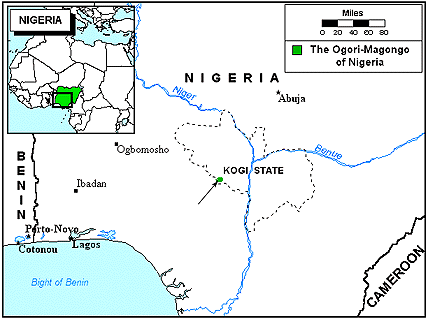The Ogori-Magongo are located in the Kogi area of southwestern Nigeria. Ogori and Magingo are separate villages in this area.
They likely emerged as a distinct group around 700 years ago, although they are related to the much larger Yoruba people. Most individuals speak Yoruba as a trade language alongside their own language, Oko-Eni-Osayen.
Like most peoples in this part of Nigeria, the Ogori-Magongo are subsistence farmers, growing millet, maize, guinea corn and beans. They also raise animals such as goats, sheep, chickens, dogs and horses. They eat goats, sheep, and chicken, along with monkeys and iguanas, which is a delicacy. They use dogs for hunting and for guarding the compounds at night. They sacrifice fowl for ceremonies. The Ogori-Magongo also engage in hunting, fishing and some trading, but these are of lesser importance than farming.
The Ogori-Magongo live in compact villages situated in either the hills or dense forests. Their houses are constructed from mud and feature grass roofs covering an outer porch and granary. Each village functions as a clan community divided into extended family compounds. The village headman manages village affairs with the assistance of a council elders.
Each year they hold the annual Ovia-Osese festival, usually two weeks after Easter. This is a rite of passage ceremony for teenaged girls as they enter into womanhood. Only virgins can participate. They are taken to a secluded place and taught the virtues of chastity, marital and community values by an older woman. Then they are brought to the village square for public recognition. The Ovia-Osese festival also involves sporting events and a beauty contest.
Marriage usually involves a long process of bride service, coupled with gifts or a modest bride price. Most tribes permit polygyny (having more than one wife), but the first wife usually enjoys a higher status. Subsequent wives usually maintain separate huts, and the husband divides his time among all his wives.
Among the Ogori-Magongo, nearly all are ethnic religionists, still practicing tribal religion.
A little less than half identify as Christian, though they blend faith in Christ with faith in the spirit world.
Although the Ogori-Magongo live in a nation where half of the population is Christian, they remain largely unreached with the message of salvation. They follow the traditions and religious practices of their forefathers.
Sadly, the Ogori-Magongo have few Christian resources available in their language. Pioneer missionary efforts and fervent prayer are needed to impact these people. Someone needs to distribute audio Christian resources.
Pray for Nigerian Christians to distribute oral gospel materials to Ogori-Magongo families.
Pray for them to have the spiritual hunger it takes to forsake the spirit world and embrace Christ, the only savior.
Pray that signs and wonders will follow the Ogori-Magongo believers as they proclaim the gospel to their people.
Ask the Lord to raise up linguists to translate the Word of God into the Oko-eni-osayen language.
Scripture Prayers for the Ogori-Magongo in Nigeria.
https://www.pulse.ng/articles/lifestyle/food-and-travel/the-ogori-culture-origin-language-and-festival-2024072513410701586
| Profile Source: Joshua Project |











